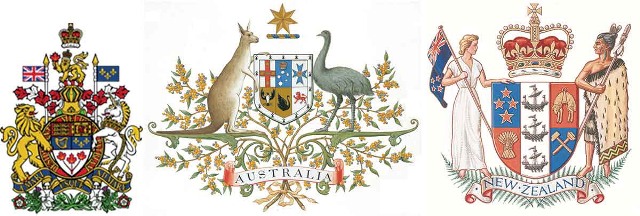 The coats of arms of Canada, Australia and New Zealand. [Permissions from the Canadian government and the Department of the Prime Minister and Cabinet of Australia.]
The coats of arms of Canada, Australia and New Zealand. [Permissions from the Canadian government and the Department of the Prime Minister and Cabinet of Australia.]
This excerpt comes from an article appearing in a special edition of The Round Table: The Commonwealth Journal of International Affairs on The Crown and Constitutional Reform.]
There is no doubt that republican initiatives will not be progressed in the United Kingdom and Canada. It will take some time for republicans in Australia to organise themselves for a further more unified attempt to win a referendum for constitutional change. Might it be plausible that New Zealand will be the first of the Commonwealth nations we have researched to move towards a republic? There are a number of straws in the wind pointing in that direction. It is true that there has never been a highly visible republican movement in New Zealand. Jim Bolger, prime minister leading the conservative National Party government at the time, went on record in 1994 as favouring a republic. He thought that this could be achieved by 2000, but his proposal attracted little interest.
The public intellectual Bruce Jesson devoted great efforts to promoting important and challenging journalism in New Zealand. In The Republican, which he published on a hand-to-mouth basis from 1974 to 1995, republican and socialist arguments were strongly put – but again attracted little interest either in the corridors of power or in the wider community. The lobby group New Zealand Republic was founded in 1994 and manages to be mentioned in the news media very occasionally. Yet by themselves New Zealand republican lobbyists seem as unlikely as their Canadian counterparts to achieve their aims. The terms of reference for the Constitutional Advisory Panel in 2011 did not include discussion of a republican constitution.
In 2016, however, the New Zealand context shifted significantly with a publication by long-serving minister, prime minister (briefly), and Law Commission President Geoffrey Palmer with constitutional lawyer Andrew Butler. Their book put forward the arguments for a new constitution.36 Their concern is that the current constitution is formed by a jumble of statutes and is unclear and inaccessible to most citizens. It can be overridden easily by parliament and is subject to political whims. Unlike those who have argued in the past for a republic and/or for a written constitution, Palmer and Butler have been bold enough to provide textual precision for a republican written constitution where previously others have feared to tread; and they have done so before the present Queen dies. The book proposed a new constitution that is easy to understand, reflects New Zealand’s identity and nationhood, protects rights and liberties, and prevents governments from abusing power.
After receiving substantial feedback, the authors have now published a revised text and supporting arguments for their codified constitution proposals. Meanwhile the political landscape has shifted with the election of a Labour Party-led coalition government led by Prime Minister Jacinda Ardern. She is on record with ‘I think within my lifetime it is likely that there’ll be a transition’ to a republic, but not in the first term of the present government.
So time will tell.
David V. Williams is a Professor of Law at The University of Auckland. From 2015 to 2018, he worked with a team of social anthropologists to investigate the roles of the Crown in the United Kingdom, Canada, Australia, and New Zealand.



